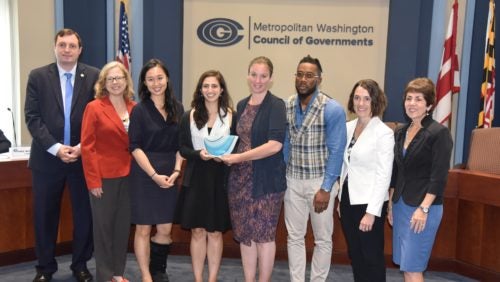Georgetown Climate Center Honored for Community Engagement Project
October 15, 2018

Matt Letourneau, Board Chairman, Metropolitan Council of Governments; Vicki Arroyo, Executive Director, Georgetown Climate Center; Jennifer Li, Fellow, GCC; Melissa Deas, Climate Program Analyst, D.C. Department of Energy & Environment; Jessica Grannis, Adaptation Program Director, GCC; Everette Bradford, Program Analyst, DOEE; Gretchen Goldman, Chair, Air & Climate Public Advisory Committee, MWCOG; Mary Lehman, Chair, Climate, Energy & Environment Policy Committee, MWCOG.
Georgetown Climate Center officials say its effort to help a Washington, D.C. neighborhood plan for climate change was unique. Now they can call it award-winning.
The Metropolitan Washington Council of Governments (COG) honored the Georgetown Climate Center for its yearlong work supporting residents of the city’s environmentally vulnerable Ward 7 to come up with ideas to make their community more resilient and sustainable. The Climate Center earned a COG Climate and Energy Leadership Award Oct. 10 recognizing the community engagement project one month after 13 residents, comprising an Equity Advisory Group (EAG), presented their final recommendations at a community forum.
“It’s a nice affirmation that this work makes a difference and that people are taking note of our engagement with the community,” Climate Center Executive Director Vicki Arroyo said. “Climate change isn’t necessarily top of mind given everything else that’s going on in the country and people’s day-to-day lives. I think the fact that [governmental] bodies that have other issues they’re facing are taking the time to award our wonderful team means a lot.”
The Georgetown Climate Center, along with the District’s Department of Energy and Environment, convened the EAG to explore how the city’s climate change mitigation and adaptation plans could better reflect the needs of Ward 7, particularly in areas around an Anacostia River tributary prone to flooding. Equity was a key focus of the effort, ensuring that traditionally disenfranchised residents had a voice in how the city plans to cope with a changing climate. Among other recommendations, the EAG suggested creating neighborhood “resilience hubs” offering environmental and other resources to residents and launching workforce development programs targeting the clean energy sector.
The effort served as a pilot project that other community engagement initiatives can model. The Climate Center acted as project manager, bringing in consultants and subject-matter experts to assist the EAG, which represented a cross-section of the community.
“It was nice for us to be part of a deep community engagement process and seeing how community interests and needs align with more wonky climate policy, where you need to think more broadly,” Climate Center Adaptation Program Director Jessica Grannis (LL.M.’13) said. “It’s not just about clean energy. It’s clean energy and jobs. It’s clean energy and affordable housing. So that was the big takeaway for us — making sure that climate policies are meeting the needs of the community.”
COG is a nonprofit with a membership of over 300 elected officials from local governments throughout the Washington, D.C., metropolitan area, Congress, and the Maryland and Virginia legislatures. Its environmental arm stresses environmental justice and how climate and energy issues can disproportionately affect certain groups, so the Climate Center’s EAG work stood out, COG Air and Climate Public Advisory Committee Chair Gretchen Goldman said.
“Part of our rubric for the awards is to look at equity, and that was a place where the Georgetown Climate Center really [shone],” Goldman said. “We were really proud to see them really walk the talk in terms of engaging communities that are most likely to be impacted by climate change and showing that model.”
Outside funding supports all of the Climate Center’s projects, Arroyo noted, and this one was no different. The District secured a $60,000 grant from the Partners for Places Equity Pilot Initiative, part of the Funders’ Network for Smart Growth and Livable Communities, to fund the effort. Prince Charitable Trusts, and the Morris & Gwendolyn Cafritz Foundation provided matching funds.